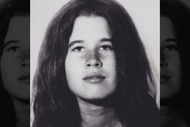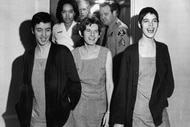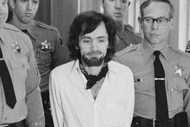Create a free profile to get unlimited access to exclusive videos, breaking news, sweepstakes, and more!
What Happened To Justina Pelletier?
The Peacock documentary "The Battle For Justina Pelletier" highlights a legal battle between a hospital and a teen's parents following accusations of medical abuse.

Justina Pelletier was just 11 years old when she began exhibiting a myriad of symptoms.
The teen was afflicted by fatigue, headaches and abdominal pain, as her family recalled in the Peacock documentary “The Battle For Justina Pelletier.” Baffled by her sudden illness, her parents, Linda and Lou Pelletier, took her to multiple doctors, including those at Tufts Medical Center in Boston, who diagnosed her with mitochondrial disease in November 2012.
Mitochondrial disease is a rare condition that occurs when mitochondrial cells are unable to produce enough energy to function properly, according to the Children’s Hospital of Philadelphia. However, because the illness presents differently in those afflicted, it’s often misdiagnosed.
This may have been the case with Justina, who was admitted to Boston Children’s Hospital on Feb. 10, 2013. Her parents recalled in the documentary that Justina was dehydrated and had severe stomach pain at the time of her hospitalization.
RELATED: How The Anonymous Hacker Group Wages Cyber Warfare
Though the Pelletiers informed the doctors that Justina had already been diagnosed with mitochondrial disease, those treating the teen believed her symptoms were caused by somatoform disorder — often referred to as somatic symptom disorder, meaning that a person fixates on concerns about their physical health, inadvertently causing them to exhibit symptoms, according to the Mayo Clinic.
In the documentary, Justina’s father Lou said that they were taken aback by the somatoform diagnosis, because they felt their daughter’s symptoms were very real. As he said, “We were never going to sign off on the bottom line that it was in her head or let someone else treat her as if it’s in her head.”
When the Pelletiers disagreed with the diagnosis and moved to have their daughter discharged against medical advice — for the second time in recent weeks — a 51A report alleging child abuse or negligence was filed with the Department of Children and Families in Massachusetts on Feb. 14, 2013.
Neurologist Dr. Jurriaan Peters recalled in trial testimony
in the documentary that the medical team felt it was “not acceptable” for Justina to be discharged, as she was “not walking, not eating, not drinking and she still had this fluctuating mental status and demeanor; so she needed inpatient-level medical and psychiatric care.”
Dr. Peters testified that Lou Pelletier reacted with anger, saying in his testimony, per the documentary, “Father was raising his voice. He was red, kind of towering close to us in the face. He was screaming. I was very scared.”
Lou Pelletier said he was calm throughout the interaction — though he admitted in the documentary to calling Boston police and reporting, “I believe Boston Children’s is about to kidnap my daughter.”
Justina was ultimately kept in the psych ward for nine months, during which she was able to see her parents once a week for an hour, in addition to 20-minute phone calls. She wasn’t allowed to discuss her health or treatment with her parents, as outlined in a treatment plan created by the Boston Children’s medical team.
Lou and Linda said in the documentary that Justina would bypass the doctors’ rules by whispering during their visits and creating hidden messages in letters. In the messages, she told them that she felt like she was being “tortured” by her caregivers — though psychiatrist Dr. Colleen Ryan testified that they made Justina do acts of self-care like “brushing teeth, brushing hair, walking, wheeling herself around in her wheelchair and moving around in general; it was not a form of torture,” according to the documentary.
The case ultimately drew media attention and a string of highly publicized custody hearings ensued, during which Linda once fainted in court and had to be taken to a hospital by ambulance, as shown in footage played in the documentary.
Eventually, a Massachusetts judge ultimately returned Justina to her parent’s custody in June 2014, after it was determined that her condition had improved.
Her parents later filed a lawsuit against Boston Children’s Hospital, as well as her caregivers, in 2016, claiming they violated their rights and committed medical malpractice.
Dr. Ryan testified in the trial that they separated Justina from her parents in the hopes of alleviating her symptoms and making her more independent, a statement affirmed by Dr. Peters. Additionally, Justina’s childhood pediatrician Dr. Binder told Dr. Peters that he also had suspicions of Munchausen by proxy.
Moreover, it was revealed by the defense that the medical team at Tufts, which initially diagnosed her with mitochondrial disease, had also filed a 51A report in November 2011, according to the documentary. The Pelletier family lawyer noted that this report was investigated and determined to be unsubstantiated.
Dr. Ryan also testified that Lou Pelletier likened the hospital to a “concentration camp,” according to testimony played in the documentary. The parents’ aggressive behavior, Dr. Ryan said, made it difficult for the hospital to find a rehabilitative care center for her to be transferred to.
However, the Pelletiers stated that they felt threatened by the doctors, while Justina testified that her condition never improved at Boston Children’s and her symptoms were disregarded.
“They didn’t believe [my pain]," Justina said, according to WBUR. “I kept getting weaker.”
In testimony footage played in the documentary, Dr. Mark Tarnopolsky, an expert called by the defense, testified that though he didn’t personally examine Justina, there was less than a 1 percent chance she had a rare form of mitochondrial disease that made her unable to walk. Dr. Tarnopolsky then discusses a video of Justina riding a horse in equine therapy, saying, “Her strength that is displayed would indicate the ability to walk and to be able to rise from a chair.”
This is consistent with Boston Children’s somatoform disorder, he said.
In February 2020, a jury unanimously decided the Boston Children’s Hospital was justified in their treatment.
“The jury’s decision affirms what Boston Children’s Hospital has always believed: that our clinicians provided Justina Pelletier high quality, compassionate care, and always acted in the best interest of her
health and well-being,” a spokesperson said in a statement following the verdict, according to the Associated Press.
The Pelletiers were dismayed by the decision, as they felt they were treated unfairly by the doctors and hospital throughout Justina’s treatment.
“This is unbelievable pain, and, really, no family should ever have to go through this,” said Lou Pelletier at the time. “We are extremely disappointed with the jury’s decision today. It was especially hurtful, I guess, ultimately for Justina. She’s the one that’s really had to live through all this.”
An expert in molecular biology has since evaluated Justina and said in the documentary that he cannot 100 percent conclude she has mitochondrial disease, simply describing it as a “complex” situation.
Learn more about Justina’s health now by watching “The Battle For Justina Pelletier,” streaming now on Peacock.



























